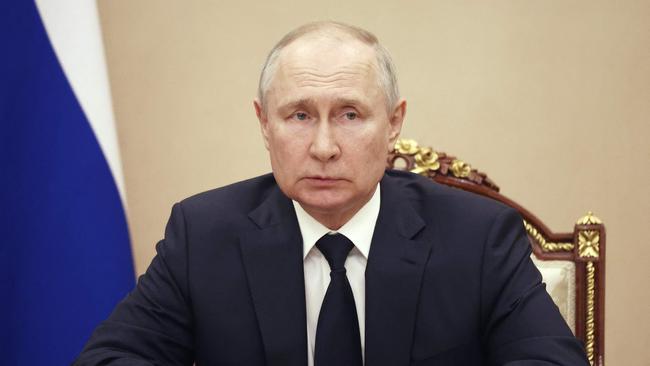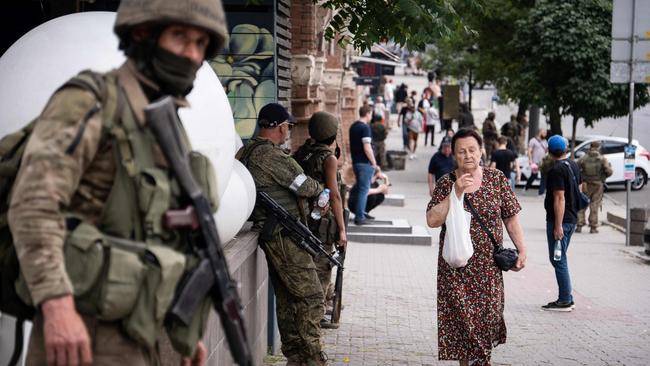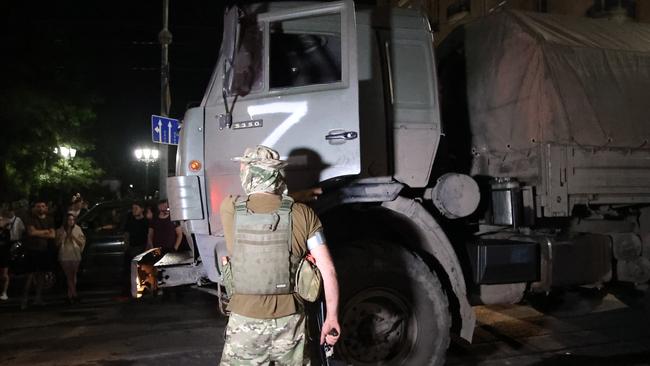The riddle, mystery and enigma of Prigozhin’s coup attempt
One thing is clear after the rebellion in Russia: The U.S. was right to support Ukraine after Putin’s invasion last year.

Watching events unfold in Russia at the weekend was like viewing an accelerated newsreel of modern Russian history.
For a while it was 1917 all over again, with a little 1905 and 1989 thrown in. A revolution erupting after a disastrous foreign war. In his remarks on Saturday, Vladimir Putin invoked the 1917 precedent, revealing that he sees himself as more Nicholas II than Vladimir Lenin.
Then there was the symbolic spectacle of a lightning march on Moscow. As social-media feeds filled with images of military convoys rolling along highways and pictures of defensive bulwarks hauled into place at the gates to the capital, it was suddenly a re-enactment of 1812 or 1941. Unlike Napoleon and Hitler, Yevgeny Prigozhin seemed to have gotten his timing right, bearing down on the city in the accommodating midsummer sun.
As the climax seemed to near, an optimist could see hints of 1953 and the death of Stalin — the decades-long rule of a brutal dictator ending in chaos and ignominy, accompanied by the merest hope of something springlike to follow. Somewhat disappointingly, it turned out to be 1991, another dime-store coup that folded like a cheap suit on its first encounter with reality. Unlike that final, desperate bid to rescue communism from the ash heap of history, this one didn’t last even a few days. No detention of the beleaguered leader in his Black Sea dacha, no drunken infighting among the coup plotters. Just a few fiery words, some video vignettes, and it was back to barracks, boys.

Everything that happens in Russia elicits a library of conspiracy theories. Even some Western officials, as they attempted to digest this strange spectacle, wondered if it all might have been staged. Mr. Putin is a master of false-flag operations. Was this a scheme to demonstrate the calm invincibility of the great leader, a warning that as he faces down his enemies at home, he will show the same resilience abroad? There was even room for a helpful cameo role for Alexander Lukashenko of Belarus, Mr. Putin’s most faithful stooge, to burnish his fading credentials as hero of the Soviet Union.
You could be forgiven for believing anything. But this seems improbable. It’s hard to see how it helps the Russian leader to have his leadership denounced by a close ally and then, after he had threatened to demolish the mutineers, to sign up to what amounts to a gentle plea bargain.
More likely the sheer impossibility of his supposed mission became evident to Mr. Prigozhin and he took whatever bargain he could to extricate himself and settled for spending the rest of his days in the lovely idyll of Belarus, where he is doubtless being lined up for an early appointment at an open window in a tall building.
The image Mr. Putin’s Russia presented these last few days isn’t one of strength but of a crumbling husk of a former empire, and its main value should be as a powerful rebuttal to the strange little army of Putin apologists in the U.S.
It will be some time before we understand what just happened and what it portends for Mr. Putin, his regime and the war in Ukraine. But we can surely already see that the abortive Wagner mutiny has revealed how wrong the critics of America’s support for the war have been.

Mr. Prigozhin’s denunciation of the invasion and the official Russian casus belli is a rebuke to the voices in the West who blamed the U.S. and its allies for the Russian violence. If even the Wagner Group’s leadership can see through the official Kremlin fictions, is it too much to ask that prominent American political leaders and so-called strategic thinkers cease peddling them?
The weekend coup attempt should also quiet the voices of those who argue that U.S. support for Ukraine is some distraction from the larger challenge of China. The longer this war continues, the more damage is done to Russia’s capability and prestige, and the more ineptitude it exposes in Moscow, the greater the headache for its ally “without limits” in Beijing.
It is clearer than ever that Xi Jinping has shackled himself to a twitching corpse, one booby-trapped with nuclear weapons, but a dead weight all the same. Long live that alliance.
A retired senior military figure told me recently that for years a key aim of U.S. military strategy has been to develop weapons designed to inflict maximum damage on Russian tanks, armored personnel carriers and artillery. As he noted with a grim smile, that is exactly what those munitions have been doing — with the added bonus that not a single American life has been put at risk.
Why would we stop inflicting that damage on China’s biggest ally now? And now that the Putin regime’s enfeebled rottenness has been laid bare, why wouldn’t we intensify our efforts to help Ukraine pursue its justified defense to a logical conclusion?








To join the conversation, please log in. Don't have an account? Register
Join the conversation, you are commenting as Logout